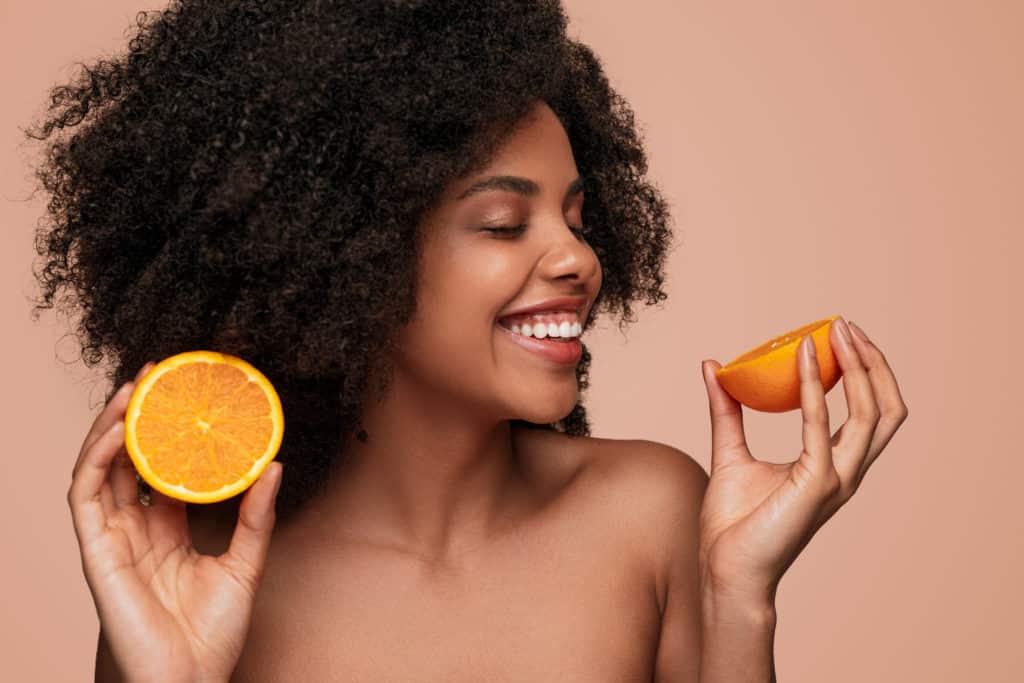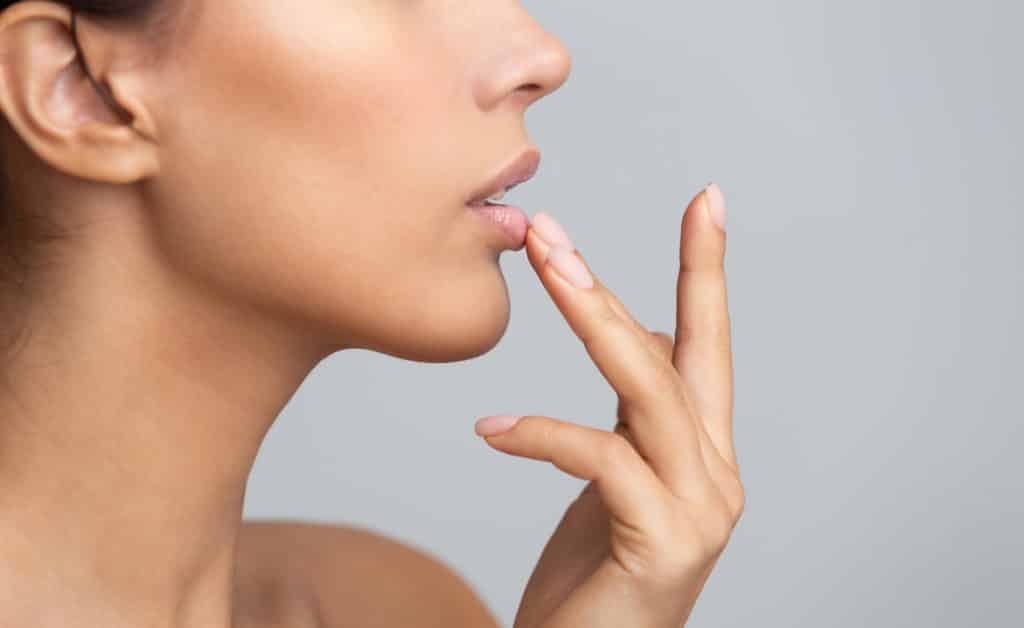What Vitamins are Good for Healthy Skin?
If you are reading this it’s safe to say you’re a smart cookie and you care about skin health. A lot of us worry about our appearance and try to cover up blemishes or dark circles with concealer, but we better back up a bit. We should think about what we put on our skin that gives it what it needs to fight infections and help heal itself. To keep our skin healthy we would do well to listen to the advice of medical experts and probably our own mom, which is: wash your face, remember your moisturizer, and don’t forget those vitamins!

Sure, you say, but which ones, and what do they do? Should I take them in supplement form, eat the right foods, or spread them on my face? Luckily, there’s no one right way to go about it, so you have several paths that may work for you. First off, it’s okay to get your vitamins from various sources, including supplements, vitamin rich foods, and the topical application of creams or serums.
At the risk of sounding similar to every Sesame Street character, great skin is brought to you by the vitamins C and E, also the letter B for B complex, and many more. So in no particular order, let’s get started with the alphabet soup of the best vitamins for skin.
See Related: Top 10 Benefits of Anti-Aging Skincare
1. C is for: Can I please have some more vitamin C?
One of the best vitamins to keep your skin looking healthy and youthful is vitamin C. Our skin has high levels of Vitamin C, which is a good thing since it has antioxidant properties that help reduce the impact of free radical damage. It does so by enhancing our immune response, detoxifying enzymes and more. Free radicals are those unstable molecules that can steal electrons from lipids, proteins, and DNA, causing damage to cells and therefore impacting overall skin health. So smooth on some Vitamin C serum and tell those radicals to steal their electrons elsewhere.
Vitamin C also plays a role in collagen production in that Vitamin C is the essential cofactor for the enzymes required for collagen synthesis, namely: prolyl hydroxylase and lysyl hydroxylase (no, you will not be quizzed on this, but feel free to store it your brain for a future trivia question). Before we get too in the weeds with these details, let’s refresh our memories about the role of collagen in skin health and appearance. Collagen, in case you aren’t aware, is an important component of your skin. It’s a protein that provides elasticity and helps strengthen skin. When we age, and our collagen production slows, this causes wrinkles to set in. You can always take collagen supplements to boost your levels, but if you can also get a little help from Vitamin C, then take it.
You’ll notice that a lot of skin care products contain vitamin C, and that’s with good reason. In one study, participants that took a once-daily treatment of 15% topical vitamin C found significant improvements in their skin. As far as signs of aging, wrinkles were visibly reduced and blotchy coloration due to sun damage was dramatically improved. That’s a win win for the skin.

If you want to conduct a little experiment of your own, try Viviane Woodard’s Vitamin C Restoring Serum, one of the most moisturizing formulas around. In addition to the antioxidants and collagen boosting benefits, this serum also improves circulation to bring that oxygenated blood where it needs to be. Since it contains hyaluronic acid, a powerful humectant best known for bringing moisture to the epidermis, your skin will feel super supple. And with extracts of Chamomile, Green Tea and Aloe Vera, this Restoring Serum is very calming as well.
2. B is for Better skin
The effectiveness of vitamin B-complex supplements on skin still requires further study, but research suggests that it can help with the production of new skin cells. Some forms may work better when taken as a supplement, while others seem to do well when applied topically. Pantothenic acid, or vitamin B-5, may help keep fine lines and wrinkles at bay for a bit, since some reductions in inflammation, skin aging, and acne have been seen with such supplements.
A B vitamin like pantothenic acid or niacinamide (vitamin B-3) in a topical cream can improve skin tone and texture, even reducing the prominence of hyperpigmentation. In this double blind study, evaluators were able to see improvements in the skin of participants using the vitamin B and E test lotion after only six weeks.
You can always ask your dermatologist for medical advice and whether they recommend getting vitamin B via supplement, cream, or just by consuming it as part of a healthy diet that includes eggs, sunflower seeds, sweet potatoes, and seafood. You may see some benefits to your skin and also enjoy a good breakfast, which is a bonus for the rest of your body.
Bonus: Why You Should Start Using Anti-Aging Cream
3. E is for Everyone likes smooth skin
While there may not be a way to win a fight against gravity, you can keep your skin from sagging as much as it might by using anti-aging creams that contain vitamin E. As mentioned above, when combined with a couple B vitamins, the results you can get are pretty darn good. Vitamin E can be found in a lot of the best skin care products. This vitamin may earn some bonus points in the skin care category since it has both emollient and humectant properties. A humectant is an ingredient that pulls moisture to the top layer of the skin (either from deeper layers in the skin or from humidity in the air), and an emollient helps soften the skin by filling the gaps between skin cells with droplets of oil. The end result is that skin is more moisturized, thanks again to vitamin E.

Vitamins C and E are both important for healthy and glowing skin. Like vitamin C, vitamin E is also an antioxidant that fights free radicals and helps to reduce or even reverse some of that sun damage. When looking for products to hydrate, heal, and smooth your skin, vitamin E is something you’ll want to see on that list of ingredients. Lucky for you vitamin E can be found alongside other vitamins in Viviane Woodard’s Nutri-Cell Complex, one of their many products that helps with skin rejuvenation and renewal. It addresses premature aging, dryness, and other skin conditions. If you were looking to reduce those fine lines and wrinkles, you may have found your perfect match.
Vitamin E is one of the best vitamins for skin that you’ll come across in anti-aging skin care products or moisturizing products. As a topical vitamin it’s one of the most soothing and healing, and as just alluded to above, it helps bring many benefits to your skin.
4. A is for About time we mentioned vitamin A, right?
You can get vitamin A through your diet with food sources like carrots, tuna, and spinach, but it’s also an important ingredient to have in skin care products. Vitamin A aids in skin cell functioning and can improve skin conditions like acne by normalizing oil production. It’s also been found to stimulate collagen and elastin formation, so it’s not an exaggeration to suggest it’s good for skin health. Vitamin A has been a favorite for all of these reasons, and it often works as an antioxidant to boot!
With all this talk about which vitamins are essential to skin health, we’d be remiss if we didn’t at least pay some lip service to the lips. Lips are skin too, after all, and vitamins play a role in keeping them soft and supple. As you may already know, your lips need both exfoliation and moisture, just like the rest of the skin on your body. A product like Viviane Woodard’s Delicious Sugar Lip Scrub is one delectable way to slough off the dry skin from your lips without pulling or tearing at that sensitive skin. But beyond that there’s other benefits, including the building up of protection for your skin against the elements and sealing in moisture. This vanilla-mint scented blissful balm has Shea Butter, which is rich in – you guessed it – vitamin A (and also vitamin E). There’s also Safflower Seed Oil in there, which can help with dryness. With other natural ingredients, this balm is just what you need to nourish those luscious lips.

Vitamin A is definitely a skin care staple, and works well with other vitamins and nutrients to keep your body moving like the wondrous magical machine it is.
5. D is for Dang, vitamin D, you’re a tricky one
While vitamin D is absolutely essential for skin health and your bones and body in general, it can be a bit of a balancing act. We get most of our vitamin D from the sun. If you don’t get enough, you could end up with osteoporosis, and if you get too much, “ya burnt” as the kids say. You can get some vitamin D from your diet with food such as salmon (and the cool thing about salmon is that it also contains omega-3 fatty acids, which can help lower your triglyceride levels). However, to get enough for your body to function properly, you’ll need to figure out how to soak up the right amount of sunshine without overexposing yourself to UV rays.
Though we often associate sun exposure with burns or an increased risk of cancer, it’s important to remember that we also require a bit of that big ball of gas to get enough vitamin D. In fact, healthy levels can actually help prevent premature aging. But beware of too much of a good thing. If you go overboard, it could lead to more fine lines and wrinkles as well as those other more serious risks we were taught to avoid. Vitamin D can help with skin cell growth, and metabolism and also enable cells to repair themselves (along with the presence of other vitamins).
So how can you be sure to safely get the right amount of vitamin D? Excellent question, and it actually depends on where you are in the world (if you’re way north of the equator in Norway, you’ll need to spend even more time outside), as well as the amount of melanin you have (the darker you are, the more sun exposure to synthesize vitamin D). Women and men also require different levels. Since it’s best to take medical advice from dietitians and other experts in the health field, we’ll leave it to Joe Leech with Healthline to explain how you should get the right amount of sun without doing damage to your body.
We hope you found some of this information helpful. Here’s to your health!
Keep Reading: What To Look For In A Moisturizer
For over 60 years, Viviane Woodard has represented “The Purity of Skincare”. We are the leading beauty brand for water-based skin care products and promote the importance of good skin hydration. Follow us on Facebook, Instagram, Twitter, and Pinterest for skin care tips, product discounts and more.
